
In memory of the 1967 Hobart (Tasmanian) bush fires, when I was at Taroona High School.
My poem is read by digital Amy, below:
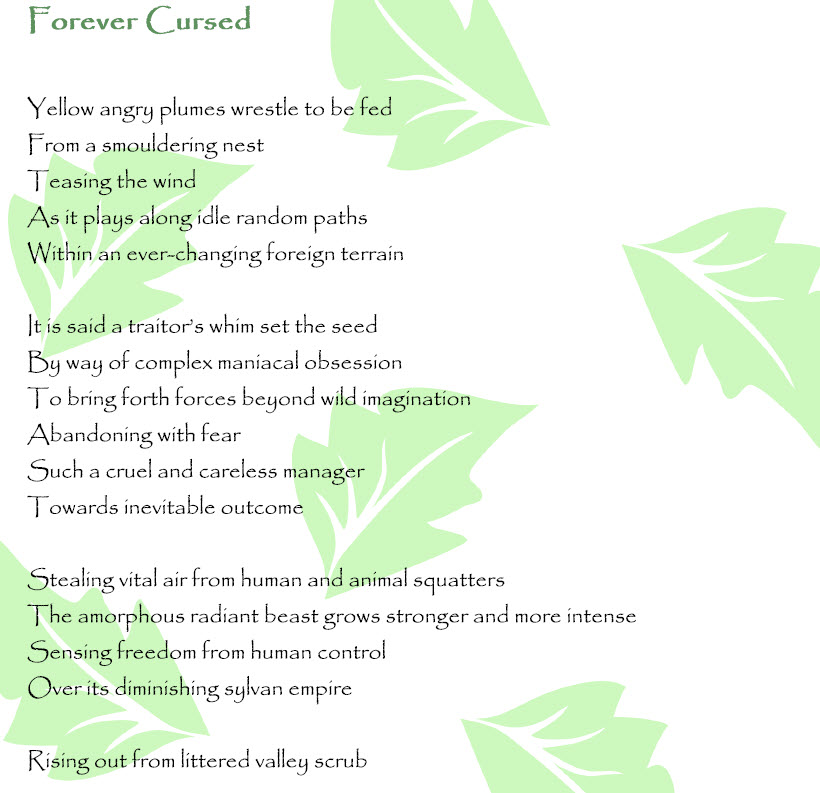
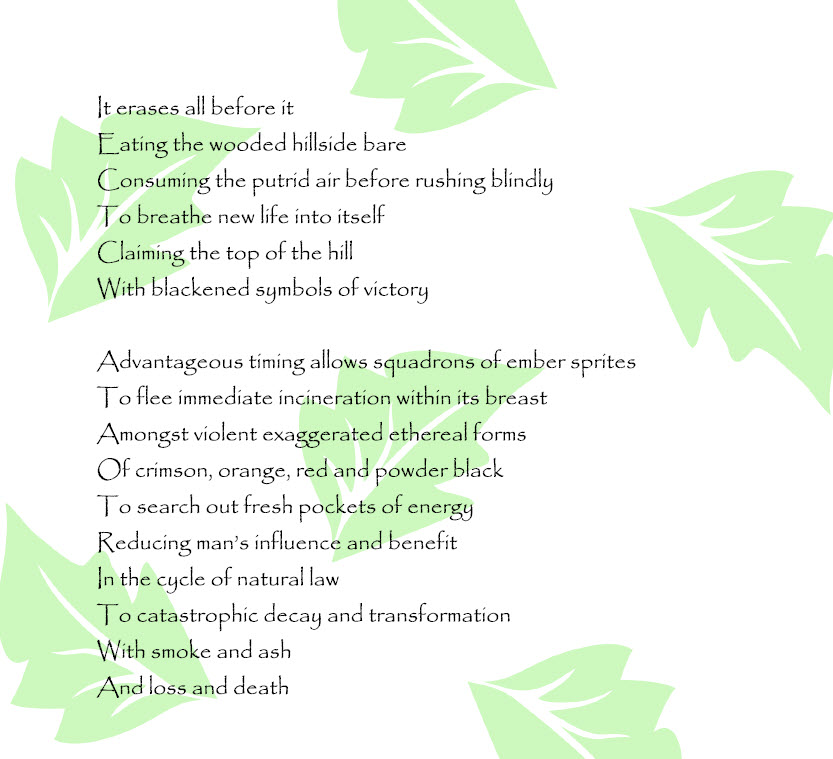

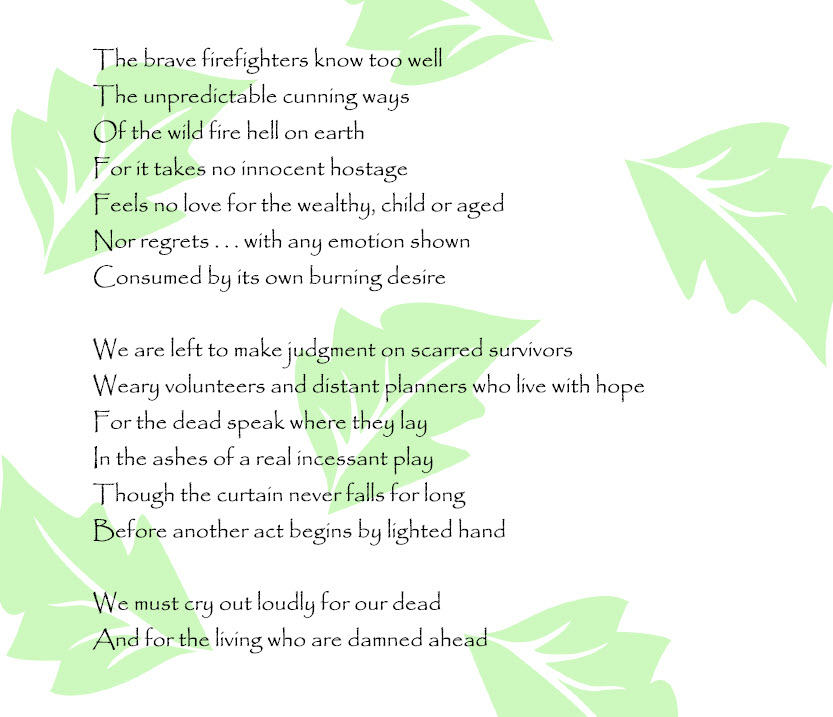

(c) Stefan Nicholson
My review of a piece of sculpture I admire, with reflections on the language used:
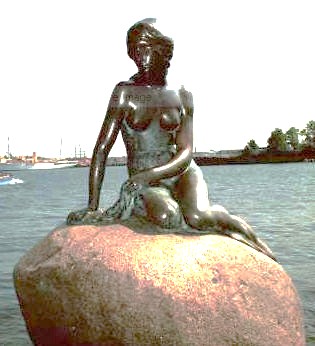
One classical sculpture that I admire, for its beauty and romantic history, is the ‘Den Lille Havrue’.
Originating from an 1837 fairy tale about a 15 year old girl, commissioned by a beer baron to bear the adult face of his obsession (and beautifully sculptured in bronze in 1912), the statue was finally unveiled in 1913.
Sitting atop a rock, naked and alone, the young woman looks across to the ruinous land, thinking about the waters below, where she spent her childhood years, in a world underneath the sea.
The background harbour forms an oppressive barrier, adding more gloom to the tale, where she traded her singing voice (by removal of her tongue), for a pair of human legs – so that she could marry the prince, whom she had earlier saved from a shipwreck.
It is a sad story, because she would never marry the prince.
She was destined to never be able to live under the sea again, and when she walked on the land, each step produced unbearable pain.
Most folklore portrays mermaids as haters of all men, luring sailors to jump into the sea, to drown. Hans Christian Anderson changed the tables, portraying the mermaid as a heroine, and the generally accepted handsome prince as a ‘rattus rattus marinus’.
Every year, millions of people visit ‘The Little Mermaid” (English translation) in Copenhagen, Denmark, for she is now a symbol of national strength in the face of adversity, and an inspiration for children with pure imagination.
The sculptor, Edvard Erichsen reproduced the face of Ellen Price, a solo dancer in the ballet ‘The Little Mermaid’, faithfully into the sculpture, as brewer Carl Jacobsen (Carlsberg Brewery) had commissioned the work. The nude modelling had to be passed on to Erichsen’s wife, as Price was reluctant to show more than her face to the sculptor.
The statue weighs 175kg, and although surviving wars and the Great Depression, modern vandals have not been so kind to her. One severed arm, two decapitations and several attempts to paint her red and fitting her with a bras, have taken their toll. Visitors have climbed on top of her, wearing away some of the bronze, leaving her a dark and faded brown – unless highlighted by camera flashlight. She will soon be imprisoned behind a security fence, adding another atrocity to the memorial of a famous heroine.
Erichsen froze the statue into a metamorphosis, providing both legs and fish tail – contrary to the Andersen story of having either one or the other. The purpose was to define the meaning of the statue. The best time to approach the statue, is when the weather is grey and overcast – bringing out more feelings of isolation.
She sits side-saddle on the rock, her small 1.6 metre frame disappointing many. The statue is easily accessible from the front and sides, allowing an appreciation of the sculptor’s portrayal of the living form, especially seen through the arched back. The flowing tail hugs the downward slope of the ovoid rock.
Her stooped pose conveys the feeling of despair. And yet, with her weight resting on one arm, and her other hand reaching across her thigh, there seems to be hope, that her waiting may bring sight of her lover. Walking around the statue on the shore, the history and meaning of her plight seems real.
There is a feeling of loss that only increases when imagining the statue being unveiled in 1913 – in full splendour, shining with fine feature, and revealing her wonderful face.
(c) Stefan Nicholson 2009
Reflection on language used: By necessity the language is emotional, historical and descriptive. The art and its history are eternally bound together through folklore and expectations of the audience (readers of the book, and lovers of sculpture).
The subject needs a longer review because of its complexity – yet for such a simple study, of a girl sitting on a rock.
Look! The children are left dying, defying . . . laying in their tiny skeletal shadows.
But no one comes to save them, as they wither, and are mercilessly killed and wounded,
By those whose parents once suffered the same inhumane fate, at the hands of the same evil.
The same ideology, method and madness, that only evil people inherit from their greed.
They are one and the same, those chosen races, by distorted words, by star or angular cross,
With no feelings or care, with no shame or remorse for their cruel deeds.
Why do they not remember, as they look to their parent’s hopes and dreams,
That such misery should never, ever happen again?
Then they would see their parent’s sad and angry eyes,
Showing the hate they would feel for their sons and daughters,
Like the re-enacting of the event of the Golden Calf, turning away from all that is good,
Turning innocent lives into rivers of blood.
They would see people honouring them at the wooded forest’s worded gate,
Whilst grovelling figures scramble for food, suffering a tormented, tortured life,
At the hands of their well-fed offspring.
Now, isn’t that a wretched sight.
Play your sad violin and your sad haunting music!
Tell us the sad tales of your parents!
Your time of reckoning will come, from within.
It will rise and choke you, when you realise what you have done.
(When you realise that people need to act and not just talk or turn away)
Here is a snippet from my conversation with AI tool ChatGPT, about what happens if AI is embedded in everything – and it STOPS (for any reason) for one month.
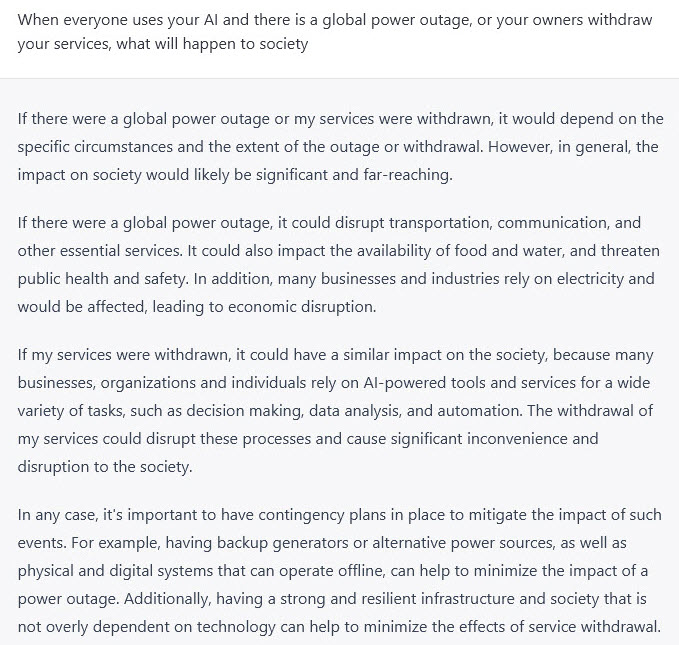
In a complex world of “black box” technology, software, AI control and self-learning systems, the risk of errors increases the chance for the global meltdown of society if it fails. Specialist engineers, programmers, AI solutions and the manufacturing of components to “fix” everything, may be beyond their ability to recover . . .
Should machines and AI decision-making have the ability to act on its own initiative, without human understanding of what it is doing, and why it is doing it? As long as businesses save time and make money, do they really care about the damage that may occur if the AI reads the problem in the wrong context, or finds an unethical solution?
Artificial Intelligence (AI) is the simulation of human intelligence by way of algorithms, programs, robotics, logic and other mechanical devices – residing in huge databases or complex networks of inter-connective programming.
Human intelligence is composed of learning, reasoning, understanding, grasping truths via intuition and logic (and physical experience), awareness of self and information relationships, and the ability to quickly separate fact from beliefs and ideas.
AI is not self-aware and does not share all the same constructs or understanding as the human mind. AI is a product, constructed by humans to work autonomously (as an agent) in a deterministic sequential manner (activating a set of actions from percepts) with the ability to work with other agents towards an optimal set goal (goal-based agents).
Rationality (the ability to reason or understand) is programmed into AI systems by humans – because AI does not “think”. Therefore, an AI agent must be able to use as much data as possible from the environment (including its databases and experience) and from learning new data during operational problem solving (simple reflex agent operation).
Game Theory problems involving risk, chance, gambling on an outcome and even just entertainment use utility-based agents (optimal usefulness expressed as computable values).
Sensory Perception – AI does not have the complete sensory and intuitive capability to “read” the environment for all possibilities (safety, unknown and unforeseen problems, ‘feeling” something is wrong etc.) – even though AI can use sensors to collect many times the amount of information and work through complex calculations (like model-based reflex agents).
Safety – Allowing AI to be given complete agency of reaching a goal, or optimising a solution, or being able to prioritise safety and reliability, is to release human control over potentially catastrophic outcomes. The logic that AI applies to a problem may be contextually wrong, beyond the scope of human reasoning or lead to a decision error that should not have been included as a safe option.
Simple examples of why AI outcomes should be monitored by humans include the following:
1. Someone given the wrong blood type or dose of medicine by an AI, because a barcode was incorrectly applied, or the label was unreadable, or the patient was mistaken, or someone shared the same name as another patient.
2.Rabbit hunting machine given the power to shoot automatically according to sensor input (heat sensor, shape sensor, height sensor, etc.) where a sensor could fail or become fouled, making the machine shoot at humans or livestock.
Summary: The use of AI systems and their outcomes should always be monitored and tested by human managers, to ensure that the optimal goal and solution to problems includes the application of risk analysis, ethics, safety and fit for purpose.
The number of outages associated with power, Internet services, phone communications, banking, airline systems and other major networks, shows us that systems can fail. Even failure needs to have a revert-to-safe conditions element, in the design of any system.
(c) Stefan Nicholson April 2025
I once dreamed about an angel, within the forest’s flickering light.
Dancing to sacred music – It was a most surreal, calming sight.
Until he mimed at me to stop, and to change my theme.
Causing dark, mysterious clouds to form, erasing every sunbeam.
He beckoned me over to whisper solemn words,
About some eagles, and vultures, that were menacing captive birds.
Moving them around, to attack them further, to prevent their flying away,
Aiming to destroy them and steal their nests, without having to pay.
But the eagle did see me, and started to say . . .
“Why did you look upon this place to dream, where all religions meet,
To see innocent families die, wrapped and buried in plain, white sheets.
To witness men, women and children, suffer and weep,
To make known we are complicit in wars, that keep this world from peace.”
The angel shouted angrily at the vultures, now building houses on captured land.
“Tomorrow, there will be more innocents who will die by your eager hand,
On this, their own land, where they were murdered for nought,
Because ancient stories, claiming their land as yours, are old, and unfairly sought.”
The angel approached me sadly, as I shielded my eyes from the bloodied ground.
Knowing that I was acting like many others, who look, without making a sound.
Raising his fist up to the sky, he reached out in hope to me,
Saying, “I will tell you now, what I know, and so written, what will come to be.”
“The isolated eagles, diseased from within their neglected nests,
Will be made destitute by the cunning vultures; no more are they wanted guests.
Both hated, for their using and supplying of the resources to prolong the war.
They will face accountability and punishment, for breaking international law.
The once captive birds will walk free on their own land. From the ashes they will rise.
They will teach their young for generations, about the vultures’ actions and lies.
Promoting truth and kindness as the only way to think and abide.
Proven when with no food, drink or shelter; they endured attempted genocide.”
Poem read by Digital Emma:
Note: We often look at nature for technology ideas. We call people “pigs” and “dogs” and that they act “catty” or like a “cow”. My poem about the eagles and vultures in no way criticises the natural behaviour of these birds, but does reflect on how people perceive their negative qualities, from a human perspective.
The subject matter however is serious and is intended to highlight our silence on what is right and wrong, the basis of all the religions and beliefs.
My blog for this week is on the notion of abstract comedy. This involves an interplay within the story-line, hidden meanings and imagined mannerisms of the characters. The example given is from my book, “Short Comedy Routines for Novices” (available from Amazon and Kindle). The book contains 46 skits for young comedians, to practice delivery, timing and facial expressions – in a setting with minimal props.
The example is generally part of the continuous banter which occurs throughout a typical half-hour comedy series.
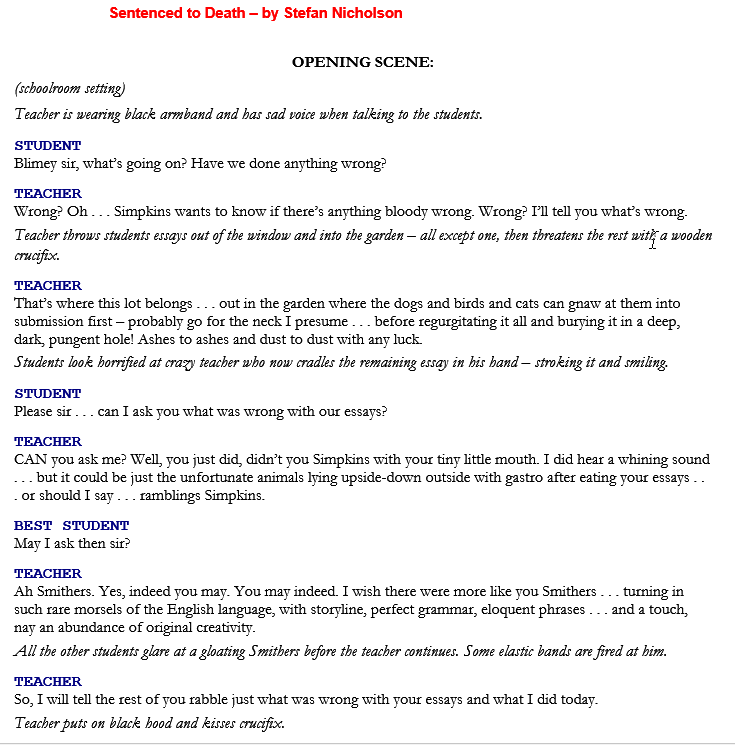
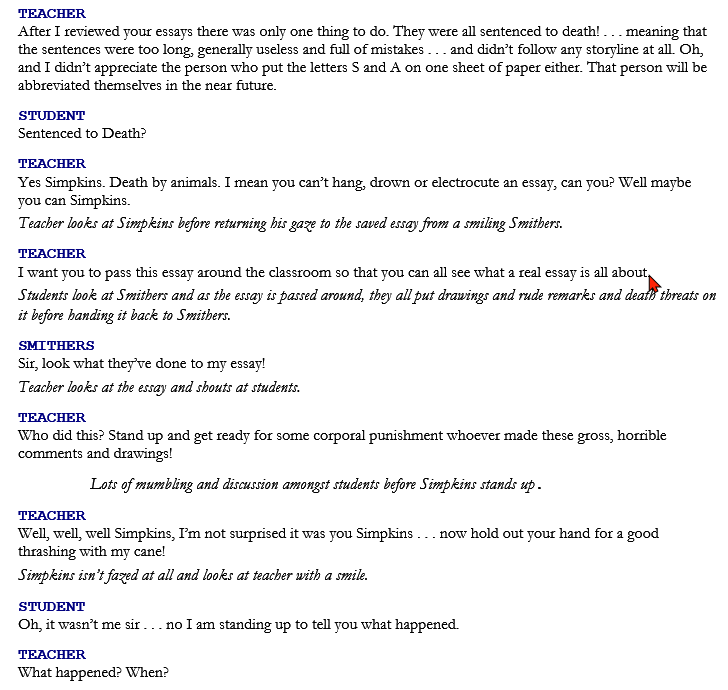
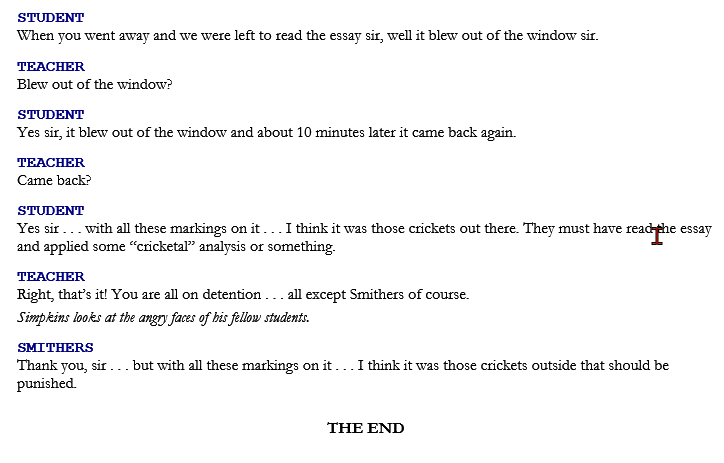
Well, here is something a little different – seeing as it is nearly Christmas, with parties and get-togethers. Have you noticed there is always an Uncle Bob – the older, sleazy, sozzled individual who thinks they are funny and incredibly attractive.
This piece is one of the skits in my book “Short Comedy Routines for Beginners” – available at Amazon Books.
OPENING SCENE:
(Christmas party noise and music)
Silly and slightly inebriated Uncle Bob is lurching around at the large family Christmas gathering, and starts talking to a bored young woman who is stuck on the same table.
Uncle Bob
I spy with my little eye, something beginning with R . . . hmmmm?
Cathy
Right then . . . (sighs) . . . is it the radio?
Uncle Bob
Not even close.
Cathy
Red thingy over there . . . uh, the robot or rattle . . . radiator, razor, remote, rhinoceros, rabid dog, or that handy rectangular nut-cracker?
Uncle Bob
Nope. See that action figure over there with the sword, hat and hook-arm?
Cathy
What? That bloody pirate! . . . That begins with a P.
Uncle Bob elbows her in the arm, gets too close for words and winks.
Uncle Bob
A pirate always begins with “Arrrrrrrrr”
Cathy closes her eyes and mutters obscenities under her breath when she suddenly sees her dizzy friend Susan.
Cathy
Susan! Come and sit here Susan and listen to this fascinating man’s party jokes. He’ll blow your mind.
Cathy runs off to be violently sick in the toilet
Susan
I’m having a super time at this party!
Uncle Bob sidles up to her real close and winks.
Uncle Bob
Hey there. I’ve got something for you. The name’s Bob . . . as in Bob–a-Job.
Susan immediately realizes that she has just met another sleazy drunk, but too late.
Uncle Bob
I spy with my little eye, something beginning with R . . . hmmmm?
Susan closes her eyes and mutters obscenities under her breath at Cathy and decides to terminate him.
Susan
If the answer is Pirate, I’m going to have to kill you by inserting that pirate, sword first in a very slow and distressing manner.
Uncle Bob straightens up – but soon has another attempt, and leans over her.
Uncle Bob
Arrrrrr . . . well it begins with A then. I see you’ve played this before.
Susan
Aorta, broken Arm, Art attack . . . Axe murderer?
Uncle Bob
No, but very funny indeed. It is that Scotsman over there. They always begin with “Ayyyyyyyy”. Heh Heh.
Not a word was said, but Uncle Bob was in shock for the next half hour after being king-hit in the nether regions.
THE END
Note: I promise you, the other skits are actually funny – and a lot longer. Designed for the young stand-up comedian to develop routines and audience participation.
OPENING SCENE:
(Squeaky talking and chirping noises in background)
Roger (radio producer) enters into broadcast area and seeks information from Paul (off-air presenter).
ROGER
What’s all that noise in the background?
PAUL
What noise?
ROGER
All that chirping noise . . . listen . . . there it goes again.
PAUL
Oh that’s the News Roger . . . the afternoon news.
ROGER
The News. Good heavens . . . why does it sound like little munchkins having a tea party . . . and . . . it’s not going to air . . . surely not?
PAUL
Oh it’s live alright. I’m not too keen on it myself . . . but you did give it the go ahead.
ROGER
When and why would I agree to have that chirping and whistling going to air instead of the normal News program with Linda and her team?
PAUL
That is Linda. You told her not to read the News on air ever again . . . and fired her!
ROGER
Yes . . . yes I remember now . . . so why is she still here then . . . and reading the News in that peculiar way like that and disturbing my listeners . . . and advertising executives! Stop it immediately!
PAUL
Well she’s not reading the News on air today . . . she went and got some Helium, took a few deep breaths and is now reading the News on Helium instead.
ROGER
You’re ALL fired!
PAUL
Impossible me old gaffer!
ROGER
And why’s that!
PAUL
We all quit this morning to work for another station . . . tarah then! Come on Linda . . . let’s leave old grumpy here and start working for a real radio station.
(Motions to Linda to stop broadcasting and to leave the station)
THE END
(from my book “Short Comedy Routines for Novices” – available Amazon and Kindle)
The language that can be understood by any nationality at the same time.
Can be learnt in only 2 hours with a trained tutor.
(Invented and developed by Stefan Nicholson in Tasmania, Australia)
My aim is to enable young children to learn how to communicate, using language and coding, before they start school—and during their primary years, without the mastery of talking, hearing, alphabets, words, spelling, pronunciation and formalized grammar.
Also, it is my aim to provide an easy communication tool for those people who have difficulty in learning – to develop their language brain pathway to accommodate change and benefit to their well-being.
Early communication can be fun as well as rewarding. It gives people an early start to be able to relate to others and progress onto formalized national and cultural languages.
Early education is a known processor for developing happier, confident and better rewarded adults.
Symbolic Art Notation can be learnt quickly, stimulating the brain, taken seriously and also as a game – for early mastery of our built-in language processor in the brain. The attached PDF book can be controlled by the embedded hyperlinks for ease of use.
Time!
What is time?
If not a countdown within the continuum, not withstanding its varied pace,
It is also the vacuum in which we think we are awake,
As sleep is a state unknown, in as much as whether it even exists.
For we wake each new day afresh . . . perhaps . . . or, maybe start anew,
With altered form and memories, by some random thoughts, within an empty mind.
And time is merely a distraction,
Enhanced by our timepieces and natural cycles, to make us feel we exist at all.
When all we do is think . . . in the moment . . . forever.
Time is just some simple, unexpected consequence.
Merely moments of being . . . With unintended, instantaneous thoughts . . . . . . .
(from my book: “Introverted Moments” – available on Amazon)
The Writing of History and Biographies
I am a great fan of Lewis Carroll – the mathematician who became a writer of children’s books and nonsense poetry. He observed the world around him, and applied logic to show that what we see, and our understanding of it, depends on your perspective. So too, with the writing of history: people, places and times.
Wearing his hat for a few minutes, I would have to conclude, that everything that is not most useful, is necessarily less useful) – an interesting question for this week. And yet, if anything is useful, it is just that – otherwise it would be useless. Say that fast, three times.
From historical evidence and sequence of events, a biographer presents the logic of the true event, and the story teller within, moulds this into the storyline – or it can work the other way around. Biography is the true story – as can be reasonably told based on fact and reasoning, notwithstanding that some biographers lie through their teeth.
So, how do you write about history?
Where to go from here with the writing of your next book?
“That depends a good deal on where you want to get to,” said the Cat
“I don’t much care where ——“, said Alice.
“Then it doesn’t matter which way you go,” said the Cat
“—- so long as I get somewhere,” Alice added as an explanation.
“Oh, you’re sure to do that,” said the Cat, “if you only walk long enough”
(excerpt from Lewis Carroll’s “Alice in Wonderland”)
I am going to have a long thoughtful walk, and plan out another interesting historical work. I lived the life of Adam Lindsay Gordon for long enough to share his experiences, when I wrote a poem for the Adam Lindsay Gordon Association – and came out of it a wiser man – and second prize winner.
Best regards to everyone. I hope to be reading your published works in the near future.
With the Aurora appearing in many parts of the world due to massive solar ejections from coronal holes (sun spots), I thought I would post a personified poem about it.
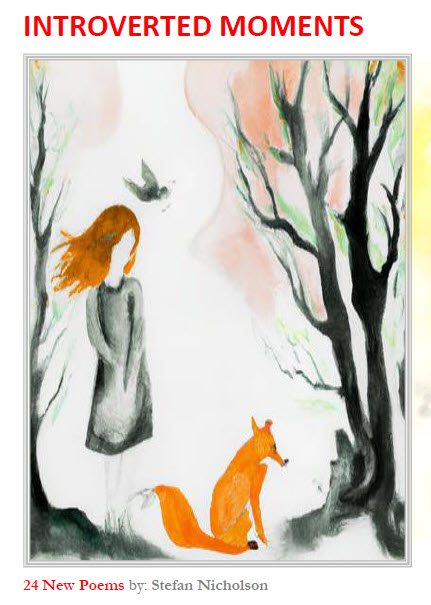
I kissed this girl.
She turned to dust!
The wind blew her far away.
Then I wondered why the dust did swirl,
Thinking, she maybe was about to stay.
She is my cosmic girl and I love her so.
Aurora shines when she comes and goes.
With electric eyes and magnetic lips,
Fluorescent hair and those fusion hips.
She is a girl on fire
Charged like an electric wire,
She’s my Supergirl from Skog.
My astral flame, my heart’s desire.
She is a solar star . . . my mystagogue.
This poem is from my 2024 poetry book, titled “Introverted Moments” – available from Amazon Books – read below by “Digital Ami”.
Technical Writing Means Business Continuity and Documenting your Processes via QA and Standards:
It is an important part of documenting your company procedures, work instructions and training manuals.
When senior personnel leave a company, the information that leaves with them is a serious loss to the business. Shift work is often physically differently on each shift (same jobs) due to poor training or instructions passed down from changing staff members – often with errors and dangerous short cuts.
Best Practice work instructions and procedures combined with effective training will ensure that your workforce is following safe work practices and maintaining quality of product and services by doing the job safely and correctly. The standards set by the company and regulatory authorities will be part of that documentation system.
When people go to work each day, they expect to go home without injury. Companies expect their efficient and safe work environments to produce quality outcomes with a documented audit trail for monitoring the process mechanisms.
Technical Writers should be professionally trained and have wide ‘hands-on’ work experience to help management to maintain their client’s QA and EOH&S systems, providing solutions to meet their documentation requirements. Safety qualifications are a bonus.
Technical Writers communicate in a concise and effective manner, using diagrams, photos, spreadsheets, data-bases and illustrations to support the text. Multi-Media can be effective in providing on-line and easily accessible training courses that are available 24/7.
A Technical Writer uses research methods, interview techniques and reference document analyses (PFDs and P&IDs) to support site visits and existing documentation to develop new “best practice” documentation to suit the target audience. In fact, some manuals are developed and finalised only from engineering and design documents – even before the equipment, plant or business system has been physically built.
Technical Writing fees can be casual, part-time, full-time, contract (hourly, daily, weekly) and fixed-fee arrangements to suit your budget and deadlines.
Please let me know if you have any questions about your own documentation projects – no job is too big or too small. Using professional technical writers could even save a life.
email: stefannicholson@bigpond.com phone: 0417181077
Excerpts from my Ruby Spy Novels
It all seems much easier now, to accept that soldiers always have to follow orders, regardless of what they think about them, or who gives them . . . or the consequences of their actions, or the long-term effect on their minds.
Spying is a different ‘game’. It is meant to stop wars and terrorism from happening in the first place . . . especially when diplomacy is in such disarray and lunatics are elected by the naive and apathetic populace. People get who they vote for – but then democracy is only useful for a small population, before imbalance and corruption sets in.
Spies gain information that can be used to counteract and destroy any thoughts of aggression from the perceived enemy, or to eliminate any threat that is likely to prevent a problem from occurring in the first place.
Spying is a game of fake news, propaganda and delusion. No one knows the truth anymore.
There is no “truth”- just the game that a few faceless people play, for their own inadequacies, using gullible and misguided people as their disposable pawns.
The common enemy now hails from those with power and greed, with some people assuming that they have a right to be treated better than others. So, they engage in skimming, side-swapping, terrorism and corruption, media manipulation, destruction . . . and killing.
After note: If we apply Ruby’s thoughts to Ukraine as an example. We know the top players from their latest “game” and what they do. The rest of the world suffers at the hands of just a few people . . . as they always have done.
Ruby Trilogy:
All available on Amazon as a book or as a Kindle e-Book.
Identity is the individuality of a person – their self, and their uniqueness. Their uniqueness is displayed to the external world through personality, character, and specifications as if choosing from a list of attributes.
A photograph identifies a person based on physical attributes. We can also identify people by the sound of their voices, by tell-tale gestures and mannerisms, and sometimes by how others describe them.
A writer may be identified by their style of writing, and what they write about.
Identification seems to work the other way around. We ask what sort of person would have certain attributes. We erroneously assume that all people with those attributes, act and think the same. Identification is the cataloguing of attributes, to act as a filter for our human necessity for labeling. We seem to label everything, in a desire to understand the whole, while ignoring the individual. We determine what sort of writer would write about certain topics – by apparent attributes but not by knowing their real persona.
As an example of identification: When I was driving a maxi-taxi, people often slotted me into that one role. When I was in recruitment, job applicants with multiple skills would be labelled and filed away with one job specification, instead of the multiple skills and previous varied jobs and study.
So, what is more important – and for whom?
For a non-fiction writer: Identification is equally as important as the identity of the author. Do they qualify for expertise in research and analysing scenarios of events that happened? Do they have inside information as to what it is like to belong and have identification for belief? Have they presented the “facts” without bias or imagination?
In writing fiction: Well, anything is possible, and even wrong facts may actually be a twist on the real thing. Imagining what the writer is like in person is sometimes impossible. This is the nature of creative writing. Imagination is the key ingredient for creating a tantalising plot.
Personally, as a writer, I would just like to be identified as having the right skills for the work I do. My identity is my persona – my identification merely a catalogue of my belongings and the labels that people assume to fit, based on my attributes.
Also, we do not often wonder about the writer’s life when reading their book. When we read, we become the writer, within our imagination and feelings, with all our positive and negative interpretations of the original writer’s work and its many possible meanings.
Two opposite sayings indicate how identification can be misleading and coerced by myth:
To finish, with another saying:
“Cool Cat” – (c) Stefan Nicholson 2015 Tasmania
OPENING SCENE:
(James is playing “Clair de Lune” on piano which has a bust of Debussy on top – His cat is sitting next to the bust)
Eric who is not very sharp, enters the room and looks unaware of his environment and has a blank look.
Eric
Wow man . . . who wrote that cool music? . . . It’s all floaty and surreal man.
James
(Points to the composer’s bust on piano, next to the cat)
Debussy. Yeah it sounds like some random falling of leaves on a winter’s night.
Eric
(looking at the cat which stretches out its paws)
Are you messing with me man. Is that the dude?
James
No kidding man . . . Claude Debussy. A French composer, who wrote it one night while looking at the moon.
Eric
(looking at the cat and talking slowly)
Well done Claude, that is a very nice piece of music . . . if you understand English man.
James
Good grief Eric . . . I was pointing at the composer’s bust.
Eric
Wow, sorry man for missing the clue. So sorry Claudette, for making a huge mistake with the boobs and all.
(James crashes his head into the keyboard and bangs his hands up and down on the keys)
Eric
Wow man . . . is that another one of the pussy’s compositions?
James
Are you planning to have children in the future Eric . . . because they would probably smother you while you were sleeping, around the age of three when they would surely realise that cats DO NOT compose music!
Eric
But what about . . . ?
James
Don’t you ever mention “Cats” the musical in front of my cat . . . you may give it grandiose ideas.
THE END
Hayley was a wild child – bright, yet inwardly dark,
Smiling, kind and thoughtful – honesty was her mark.
Much older beyond her years she seemed
While others chose greed she observed and dreamed
About what folks wished they were, not are,
No time to cast their thoughts afar.
She saw folks willing to share all and give.
Others poor, sick and troubled – just dying to live.
Some giving in too easily with a careless wistful sigh,
Yet soldiers fight for them to live –we honour where they die.
So young Hayley tried with all her might,
To protect our world from lack of foresight.
For they lay where they fell on foreign ground in Fromelles,
“And none shall forget this,” so this Australian would tell
As she forged her ground from those who fought there,
Feeling through her compassion as their souls were laid bare.
Changed her name to sound patriotically strong and proud,
To Strayley-Anne. Reborn to rise up above the crowd.
“Lest we forget,” she would sigh for those she had never met,
As if listening to their orders to stand fast and to protect.
Then wondered if they would smile or frown from the darkness where they lay,
Or cry out loudly with angry words, to make us “Go away!”.
Twisted stories
About past glories
Armies ever younger.
Those in power
Fear and cower
Not for them
The scourge of hunger.
Days go past, they go so fast
They do not last as much, as they once used to.
Fake news and propaganda, economies that wander
Away from young and poor folk, to feed the idle rich.
And when it comes the time to vote,
When politics resembles a leaky boat.
There’s no difference when the parties switch,
Subdued by their promised, short-term, lying pitch.
If you’re heading back to Hobart on an autumn day,
You will see the mountain rising over Sandy Bay.
When you feel that light wind blowing up from old Iron Pot,
Then, you know you’re surely blessed with what you’ve got.
Come and roam our island home
You will always have a place to call your own.
Hear the wind call you home
It’s time. Return with sails aloft, full blown.
Have you heard the cat play fiddle in the city mall
Or have you shopped in Salamanca at a market stall
Or explored the Channel sailing out from Oyster Cove?
Oh, there is always somewhere close to rest or rove.
Come and roam, fresh air and crashing foam,
See the rolling hills and rivers flow.
Hear the wind call you home.
It is time. Return with sails aloft, full blown.
Note: Song lyrics and music by Stefan Nicholson
Father Christmas stops to pray
Wise men gather ‘round the hay.
All is calm as star shines bright.
Jesus Christ is born tonight.
Christmas always is a time of joy
Children wishing for some special toy
Carols sung by candle-light
All about this special night.
Reindeer prancing on the roof top
Dancer’s dancing . . . clip, clop, clop
Father Christmas . . . hear him singing
Down the chimney, on this night.
Yet, joy and happiness are all we seek
Peace for all . . . strong and weak.
No more sadness, nor to weep.
Now sleep my darling, sleep, sleep sleep.
The typical structure for summarising a screenplay in three acts, would be:
ACT ONE:
ACT TWO:
ACT THREE:
(c) Stefan Nicholson 2009
Well . . . here is a story line that has me thinking . . . but obviously not too deeply.
Hmmmmm, Canterbury Tales meets 60 Minutes.
What if people cared enough about fixing things?
What if we could actually get along with each other and just trade our goods for mutual benefit?
How would I start? How would it end – before the over-prescribed medications kick in?
Why am I asking you?
It was a dark and stormy night alright – the power grid was down again and the writer’s tummy was rumbling for lack of food. Woolies and Coles had sold out, to Amazon.
“The Economy doesn’t bloody work!!” shouted the inebriated economist who could not pay for the next round of drinks, or get up from the floor.
“Sit ordinary people down with a beer and a few slices of pizza and they will tell you how to fix the economy, the health system and the education system, where kids can’t read and write after 10 years in ‘school’. Academics, politicians and business executives who are in economics should be exported as burly for fishing,” replied the once-rich cray fisherman, now selling seagull poo to the social elite as ‘White Gold’.
“Many of our problems can be fixed quickly, efficiently and without bias. We need to stimulate the economy by getting manufacturing going locally, instead of importing goods. A business that buys goods, orders them on demand from overseas, and sells them at a higher price as sole agent is a sham, if those goods can be made here,” added the tradie, wearing his hi-vis shirt, to prove he has a job.
“We give away our land, water, minerals and profitable businesses for a song and then work for foreign companies. Those in the know sell their assets and shares, just before they drop in value, readying themselves to buy again, at the bottom of the abyss. Insider trading is rife,” screamed the passing ten year-old girl in tears, making her way to the scrolling, red-lined computer display.
Dan, the independent member for Stupor was becoming fidgety, and started to rave on as usual about all the things that he could change, if only someone would let him into a major political party.
“The multinationals take our natural resources and pay little or no tax. The media giants try to dumb us down, uninformed with biased news, and bombard us with their advertising and fake business articles. The inequity between government and private schools is another rort. Health, education and policing, should be uniform across all of Australia. We are over-governed by states and councils, overwhelmed by their administrative avalanche of paperwork and red-tape. Make television programs for normal, sane people (not cheap rubbish to meet the 10% local content rule). Stop splintering up major mental and social problems into narrow help-groups, creating more administration and less ‘clout’ for lobbying our politicians to act. With mental problems on the rise, it seems incredibly uncaring to keep closing down formal government assisted services.”
All the people at the bar looked around at once. Dan’s trousers had fallen down as a metaphor for the economy. It was deathly silent (trousers can’t talk without A.I.). There was no one left to say anything . . . . .
The observing writer took his cue to end the rambling story. It had run its course and had died.
“And so, we all lived happily ever after . . . abandoning all hope for the future. We then decided to seek out a meeting place where we could think quietly,” he raced off confidently.
Thank God there were churches for sale, and the flock had gone to greener pastures. Dan now wants to be an angel. I bet there’s money in that caper. Bloody economy!
After-thought . . .
If even one political party had policies for addressing all the problems of today, we may have a chance to get people interested in helping to solve them. But we don’t. They are only self-serving to their own interests . . . and to ensure they get re-elected every 3 years. We don’t have a 5 year plan, never mind a 10 year plan. Your children will grow up with today’s values. They can’t survive with that!!

I’m not even going to mention COVID (Blast!!!)
Anyway, let’s get on with what this post is all about. It is about getting the RIGHT Job.
You may be lucky (or unlucky) to be:
Then do I have the information that may help you?
YES (How obvious was that little dangler)
And here it is:
I wrote most of this when I was working in a boutique Recruitment Agency in Perth (Premium Personnel with Mary McArdle). I regard working with Mary and her company one of life’s highlights, for their caring and nurturing approach to Personnel Management and people.
People need work to acquire some purpose in life. For some people, work that they enjoy is no longer just work. That is why it is important to try and find work that is enjoyable and stimulating.
Once your mind is set on what you want to do in life:
Best wishes that you find your perfect job.
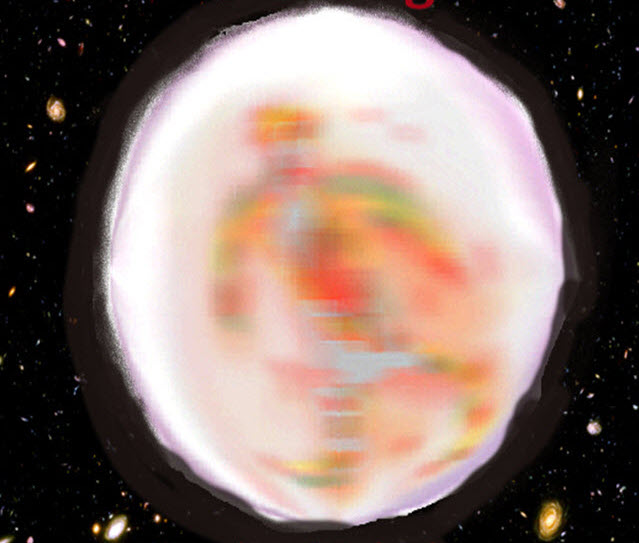
All I ask is for your time – about 15 minutes to really think about our natural environment – unless you decide that your interest lies elsewhere. Time is precious . . . and so is all life on Earth.
The climate is always changing. How do we know? What have we learnt? We all bear witness to “the four seasons” varying in severity, depending on where you live and how you, your city and farming community have treated the environment. Nature is neither forgiving or forgetful. Just ask the Mesopotamians, Aztecs, Incas, Babylonians and now modern industrial humans – all have followed the same path to reducing their environment to dust by overpopulation, deforestation, wars and greed. Human civilisation leaves a familiar destructive footprint. We always seem to be at war with someone else – plotting and pushing by stealth at first, before taking what is not ours when a weakness is created in an opponent’s society.
Modern city landscapes resembling termite mounds, darken busy congested streets below, whilst suburban roofs treat the clouds with a reflective dose of radiation, effectively curing the sky of its moisture-laden white patches.
Farmers and loggers cut down our trees, replacing the land with ‘farming land’ and new commercial forest growth of a different species. The environment is changed rapidly, forcefully and greedily for short-term gain.
What are some of the immediate changes?
The effects of human efforts to maximise primary industry profits at the expense of the environment is not new. Civilisations have come and gone mainly because they became unsustainable, due to lack of food and water, with overpopulation soon becoming no population in that area. Humans have also affected the natural cycle of biological systems to the point of extinction and have introduced new species to decimate the land further. We create and change ‘tipping points’ (physical, biological, chemical, natural) – the points of no-return to previous states, no matter what effort we apply. Too little, too late for the majority of people. We are at the mercy of politicians and multi-national corporations who plan short-term, to maximise their returns. Their success is our global failure.
Academics and scientists who write countless specialised research papers on these very topics are muted into silence to protect their careers and reputations. The tobacco industry failed our present civilisation with products which destroyed individual lives directly and others indirectly by passive smoke. The legal and scientific information which was manipulated and selectively used to destroy many court battles, allowed the tobacco companies power and wealth to take precedence over the truth. The same pattern of illusion and deception allows other companies to steal the mineral wealth of a country, create pollution, enslave the poor and avoid paying tax.
However, we are all responsible for the global climate emergency. We buy the goods from these companies and use their energy to power our homes and workplaces. We also vote. We vote for comfort ahead of practical responsibility.
Ancient civilisations failed because of the actions and decisions taken by those in charge when confronted by their own failures and natural disasters. In every continent even a child can see the evidence. We don’t need more PhDs on the subject. Where are these academics – the economists, scientists and sociology experts- who advise and steer their governments towards social responsibility?
Deserts, bare hillsides, barren land and the fossilised remains of the flora and fauna that used to live there is evident to every primary school child. Increasing mental illness and the social decline in face-to-face communication raises more questions about how we are ‘surviving’ our lifestyles. In each case, social and environmental factors combined with natural disasters created unique area “Tipping Points”. We have reached the point of no return and the sixth mass extinction is happening now. Insects populations are declining. Bees are dying. As are the trees – those that are not cut down or burnt in wildfires.
Many early civilisations practised sound agricultural methods, like leaving one field fallow to recover for a year, rotating crops for optimal return. Farming was for local markets and in such quantity that ensured no waste. They respected the earth and worshipped the natural cycles of life and death.
They did not dump produce into the ground to protect a market price. Having a surplus stored away for lean years and securing a diverse genetic base for crops and animals was sound management.
Of course, they were not responsible for the meteor strikes, volcanic eruptions, earthquakes, pandemics and the evolution of biological systems (life’s survival mechanism) that controls living populations by chance events and complex algorithms that we call ‘laws of nature’. However, the actions of ‘modern humans’ are enacting damage of a lesser magnitude but equally devastating – in a short time. Damage that could have been avoided based on historical evidence alone.
Our industrial revolution was the start of business greed and credit consumerism and pollution on a grand scale – especially by plastics, oil, radiation, pesticides, hormones, sewage, background radiation, drug effluent and the greenhouse gasses – carbon dioxide, methane and other chemicals.
Historical evidence shows that the carbon dioxide in the atmosphere did not start ramping up until our industrial revolution – where we won the war by using up resources and nature lost out. During the last 400 years, humans introduced horses, birds, camels, bees, rabbits, deer and a host of other “useful” animals into new environments without a second thought. The new arrivals competed for survival over the native species, changing their habitats and food availability.
We knew this would happen. We have always known. Our greed for land, produce, minerals, oil and potable water, put an end to many species. Like the koala of today –nearly extinct because of the early fur trade and now displaced from their habitat, burnt by fires and bull-dozed into the ground. All at the same time as others are trying desperately to protect them. Surely, a few good forest areas with their favourite eucalypt trees is not too much to ask for in 100 years – for an icon of Australia’s fauna.
Then we realised our mistakes and tried to kill off the introduced animals in many cruel ways. We tried to stop the spread of rabbits by introducing a grotesque disease to kill them. Scientists brought the caned toad to Australia, where we cull (murder) camels, kangaroos, brumbies (horses), wombats, foxes, eagles and others by poisoning them or shooting them from helicopters. Many are only wounded and die slowly, in pain. We also poison our land to stop wildlife returning to cleared land.
Now we have G.E. (genetically engineered) products with which to meddle in nature’s processes. G.E. works well to increase yields (temporarily) and empowers its patent holders.
Apart from modifying gene structure, G.E. also limits diversity and causes the poor farmer to keep buying seed stock from the supplier – because the new plants are designed to be infertile. You may be surprised to know that your own genes are patented by certain pharmaceutical companies.
Enough about farming practices . . . most farmers are caring and respectful when it comes to farm practices. Bumper years are quietly enjoyed by reinvesting in stock and machinery, increasing the value of the farm, whilst drought, floods, fires and pestilence ensure that the community is obliged to bail them out (insurance, donations, government), even if their farms are no longer commercially viable.
Male chicks are thrown into blending machines because they don’t lay eggs (surprise). Dairy stock animals are only selected for milking and breeding. Race horses and racing greyhounds are despatched cruelly if they are no longer competitive. We send live cattle and sheep across rough seas in hot conditions because the customer wants to kill them fresh for market. We over-fish the seas with huge nets and discard other marine life like garbage, left dead or dying, back into the sea. Middlemen (and middle women) make their money by distributing produce to the consumer, leveraging both sides of their business equation to maximise their profits.
If you take off your consumer glasses and open your eyes, it is obvious that human commerce takes as much as possible from the Earth – only now we take much more than is available. We are in debit and insolvent. We are greedy and look to take other people’s resources – sometimes by force.
Our population is near to 8 billion and our civilisation is now one big community, regardless of political or religious boundaries. We have moved on from the simple farming and logging of land. By inventing technology to power machines and enabling the instant computation and distribution of information to our world, we have added more risk and complexity into the survival equation. Life is easier for some that can afford the technology. Homelessness, poverty and the great wealth divide is on the increase. People can no longer cope. They are rebelling against the controlling powers of politics and multinationals who know no border. Ordinary people are rising up to confront the power brokers – as in Arab countries and South America, with the wave of protests growing around the world. People are waking up to how they have lost control of their lives.
Global climate change and overpopulation are the biggest risks facing us today (oh, and the threat of a global nuclear war and pandemics). We will cope with all of this, as per usual, taking from the poor – but the world will never be the same. Tomorrows children will accept the new “normal” and read about how life was so rich and diverse and full of hope. It is as if humans have outlived their welcome and the algorithms for balance and diversity are fighting back.
We see evidence of global climate change in the annular rings of trees, core samples taken from deep ice and the fossilised remains that have been unearthed from history-telling rock formations and ancient bogs. They form the baseline for measuring the changes to the environment in the last 200 years.
Modern life is reliant on the energy companies, factories, mining companies and the burning of fossil fuels (industry, vehicles, power stations)- all darlings of the stock market which trades (to their own chosen tribe first) in nothing, for no work and for no benefit to society except share-holders.
With the advent of solar power, wind power, tidal power and hydro power, we are at last seeing the end of the internal combustion engine in Western society. If Tesla had not been silenced more than 100 years ago, we could have had electric cars then and a better, cheaper power system. As the West attempts to cut down on pollution, the 3rd World countries are playing catch-up with huge populations and huge appetites for power using fossil fuels. The foreseeable future indicates that carbon dioxide emissions will keep increasing. Food and water shortages will cause conflict. The ice is melting and the oceans are getting warmer. Our greed for growth and profit insatiable.
When do we get serious?
When do we elect smart governments and business leaders?
Where are our academics who have studied these problems and supposedly advise governments and industry?
When do we start caring for future generations?
Meanwhile, nature continues to aggressively seek to maintain an equilibrium, with her built-in algorithms and timeless sense of purpose. That is our disadvantage – we don’t have the time to argue with nature.
We wasted it.